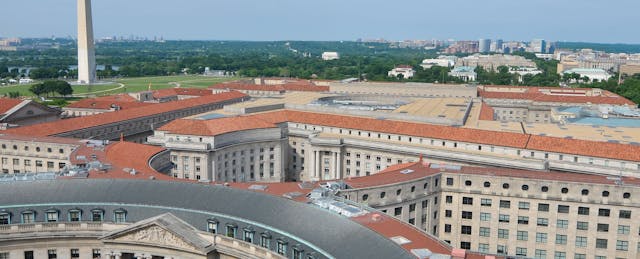It’s hard to sum up the mood at the day-long White House symposium Tuesday on “Sustaining the Momentum for Innovation in Higher Education.” One attendee from an edtech company said “apprehension.” A higher-ed leader called it “surreal.”
Officials from the U.S. Department of Education planned the event long before Donald Trump won a surprise victory in the U.S. presidential election. So the gathering, of about 200 leaders from colleges, companies, and nonprofits, had likely been designed as an upbeat way to prepare for a like-minded administration. It ended up as a place for these leaders in higher-education innovation to gather to ask each other, “What now?”
“The elephant in the room is that 66 days from now many of us in this room will be unemployed,” said Ted Mitchell, Under Secretary of Education, during his opening remarks. “We can’t talk specifically about that now,” he added.
Sure enough, the impending Trump Administration remained largely in the background during the formal proceedings, as a who’s who of change-minded leaders involved in higher education summarized their work, much of it supported by the Obama administration, and highlighted their successes.
In fact, the Education Department’s staff made clear that they remain in power for now, announcing a new project that it is supporting with the design firm IDEO, called the Future of Higher Ed Challenge, that calls on the wisdom of the crowd to bring fresh thinking to how college might be reinvented. (The goal, as Mitchell explained it, is to “get some sort of moonshot ideas out there.”) And officials reminded participants of their upcoming report, planned for release in December, that will put a higher-ed-focused supplement to the department’s National Education Technology Plan.
“We’re going to sprint through the tape on this,” Mitchell told them.
Talk in the hallways turned back to that background question:How will Trump’s administration approach higher-education innovation? No one here knew, including Mitchell.
Trump’s transition team hasn’t met with anyone from the Education Department yet, said Mitchell, during a briefing with reporters. When new top leaders for the department are announced, Mitchell and his colleagues will meet with them and hand over a “briefing book” in what he called a “pretty standard” handoff. “I’m new to this,” he said of that part of the job. “The President was clear that he wants us to cooperate.”
Mitchell stressed that the “stream” of innovation was already flowing before the Obama Administration came along, and that he expected experiments to continue. “This is a community that thrives on the new, and this is a community that will continue to pursue new ideas and new innovations in ways that will be above anything that has to do with D’s and R’s,” he added, referring to Democrats and Republicans.
Many attendees echoed that sentiment in various ways, in interviews.
Harrison Keller, the University of Texas at Austin’s deputy to the president for strategy and policy, emphasized that states do much of the most interesting work these days in edtech innovation. “We’ll hopefully get more opportunities for states to be good innovators,” he said.
Karen Wilcox, co-director of MIT’s Center for Computational Engineering, noted that research in neuroscience is gaining momentum that seems likely to continue no matter who is president. “We’re going to figure out more about how the brain works,” she said.
Burck Smith, CEO of StraighterLine, argued that he sees more and more upstarts like his that offer new alternatives to college. “We will see continued expansions of these new models,” he said. “It’s happening.”
Not everyone was so upbeat, though.
“The stock market thinks that this is a great thing for for-profit universities,” said Matthew Z. Rascoff, the University of North Carolina system’s vice president for technology-based learning and innovation. “That’s troubling for someone like me who is hoping to outcompete them.”
He pointed to a quote from Bill Gates, who argued that fixing the education system is a harder problem than eradicating polio or other global health challenges. Rascoff says that the idea was that when changes are made to education policy, future leaders can quickly revise or unwind, unlike health infrastructure, which tends to stick around once built. “This is the fear, really,” he said. “How much of this can be undone? Things like EQUIP can so easily be ripped up and dismantled,” he added, referring to the Obama Administration’s Education Quality through Innovative Partnerships program, which waives some federal rules on financial aid for selected pilot projects trying new ideas.
In between panels on “Improving Teaching and Active Learning” and “Changing Credentials and New Models of Education,” participants shared the latest speculation from news reports about who Trump would name as his education secretary. And there were a few jokes during panel discussions. “I was surprised to see that Washington was still here and that the White House was not gold-plated yet,” one venture capitalist quipped. The president-elect said little about education policy during the campaign, making it hard to proffer an educated guess.
“Perhaps the best we can hope for” from Trump on education innovation, said Catharine Bond Hill, former president of Vassar College who now leads Ithaka S+R, “is benign neglect.”


